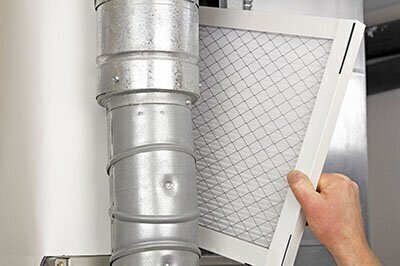Maintaining Your HVAC Equipment
 Replacing the air filter frequently is the most important maintenance for HVAC systems. Check it monthly until you see how quickly it gets dirty at different times of the year. When a filter has a matting of dirt—i.e., it’s difficult to see through when you hold it up to a light—it’s time for a new one (usually four to six times a year).
Replacing the air filter frequently is the most important maintenance for HVAC systems. Check it monthly until you see how quickly it gets dirty at different times of the year. When a filter has a matting of dirt—i.e., it’s difficult to see through when you hold it up to a light—it’s time for a new one (usually four to six times a year).
A dirty filter makes your system work harder than it should, reducing performance and energy efficiency. A filthy filter can be especially bad for heat pumps and air conditioners, since it can cause evaporator coils to freeze up and possibly cause the compressor to fail.
When to Schedule Professional Maintenance
Contractors often argue in favor of annual or even semiannual maintenance visits. But they know that the more visits you pay for, the more money they make. Plus, if these visits happen before peak heating and cooling seasons, the contractor gets a steadier revenue stream. Most equipment manufacturers also recommend annual professional maintenance checks.
It’s important to do maintenance tasks regularly (see below), but we don’t think once- or twice-a-year visits are usually warranted. There’s little hard data indicating that reductions in energy use or increases in equipment life offset the cost of frequent professional maintenance visits. And blanket recommendations of annual or twice-a-year maintenance visits seem arbitrary. Frequent maintenance is justified if your system is old, heavily used, has a lot of dust and pollen around it, or has broken down several times in the past. Newer units likely need to be inspected far less frequently.
In the end, there is no absolute right answer on how often you’ll need maintenance. Ask technicians to explain their reasoning behind any recommended maintenance intervals.
Gas and Electric Furnaces
Gas and electric furnaces usually need less professional maintenance than other types of equipment. But it can be worthwhile to have a professional visit every few years to clean and adjust your equipment for efficiency, and to look for existing or potential leaks of fuel or combustion products. If your unit needs repairs, make sure the technician also does these basic checks and tasks.
Central Air Conditioners and Heat Pumps
Regularly clear away debris from the outdoor unit, keeping grills free of grass clippings, leaves, and other debris, which can inhibit airflow.
Other maintenance tasks are usually performed only by professionals. Condenser coils need to be checked for surface dirt and dust, and cleaned if necessary. Electrical connections and contacts need to be checked visually, and capacitors should be tested. Controls designed to protect the compressor from high or low pressure should also be tested. Finally, the refrigerant level should be checked, with refrigerant added, if necessary.


